Highlights from the 2018 Summer Teachers Institute

A shorter version of this post was shared via our JMM Insights e-newsletter on August 16, 2018. To read past editions of JMM insights, click here. To read other posts by Ilene Dackman-Alon, click here.
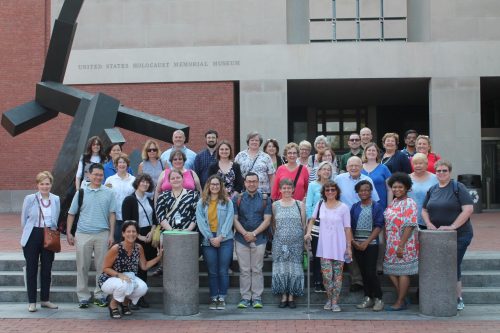
This year’s program, Lessons of the Shoah: Primary Sources for the Classroom, provided participants with new ideas as well as new program and education resources to help make Holocaust Education more meaningful for students. The following are program highlights:
Day 1
Our first day convened at the Jewish Museum of Maryland. Howard Libit of the Baltimore Jewish Council and Marvin Pinkert, JMM Executive Director gave welcoming remarks to the group. Mary Johnson of Facing History & Ourselves opened the program and asked participants to think about the 1st anniversary of the white supremist rally in Charlottesville, VA. She posed the question; how do we discuss this event with our students and how do we teach our students not to be apathetic and to be engaged in the conversation? The topic was a natural segue to Mary’s presentation about the rise of Nazism during the 1920-30s. Mary spoke about Doris Bergen’s Four Stages of the Holocaust and gave the teachers suggested readings to take back to the classroom from the Facing History curriculum. The teachers participated in classroom activities to illustrate the four stages.
Following the break, the teachers heard survivor testimony from Mr. Herbert Hane, who shared his experiences growing up in Adolf Hitler’s Germany. After lunch, we focused our learning on the thousands of people trying to leave Europe during the rise of Hitler and Nazism. The teachers watched the JMM’s short documentary, Lives Lost: Lives Found: Baltimore’s German Jewish Refugees 1933-1945 and learned about the exhibition that uncovered the stories of more than 3000 Jewish refugees that were able to make a new home for themselves in Baltimore with the assistance of many local Jewish residents. The teachers also participated in an archival exploration activity that is a popular resource for classroom teachers in helping students use more critical and analytical skills. At the end of the day, each teacher received a copy of the JMM’s 2017 publication, Holocaust Memory Reconstruction Project.
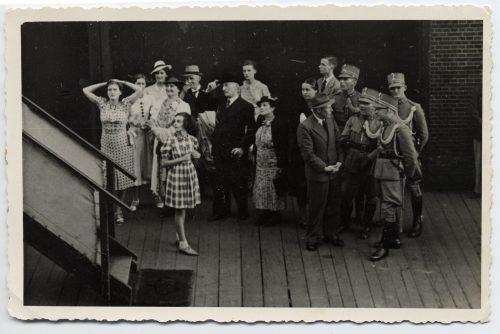
Day 2
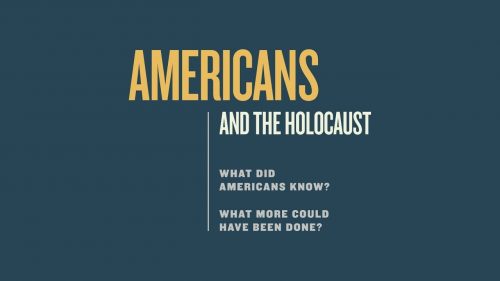
The exhibit reveals how much information was available to Americans at the time and asks why rescuing Jews did not become a priority, except for a few individuals who took the risk to help. The afternoon presentation by USHMM scholar, Rebecca Erbelding, focused on an on-line resource created as a companion to the exhibition. Dr. Erbelding demonstrated many valuable features of the website which includes a vast array of educational resources.
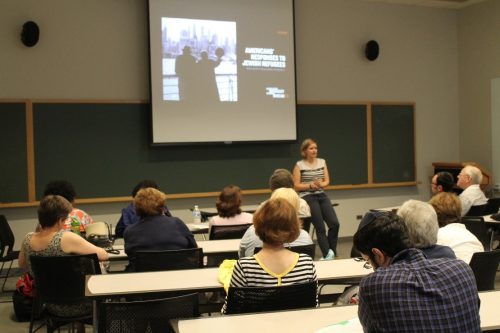
Day 3
Day Three took place at Towson University/Baltimore Hebrew Institute, with Dr. Hana Bor, Peggy Meyerhoff Pearlstone Professor sharing her research findings on The Impact of the Summer Teachers Institute: Teaching and Understanding the Holocaust.
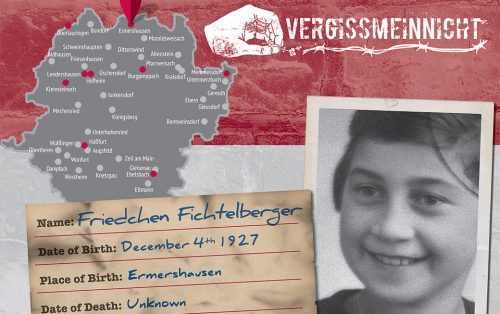
Ashley Todd Diaz- Head of Special Collections and Joyce Garczynski, University librarian gave an overview of the exhibit to the teachers. Teachers were able to try out the sample lessons on iPads in connection with the exhibit. Dr. Fred Katz, who is featured in the exhibit, spoke to the group of his experiences growing up in Germany but also about his later work as an author and sociologist. After lunch, the teachers headed to the University’s Special Collections and Archives. Elaine Mael and Ashley Todd Diaz gave the teachers a presentation about the rich holdings that are available at the library in Holocaust education.
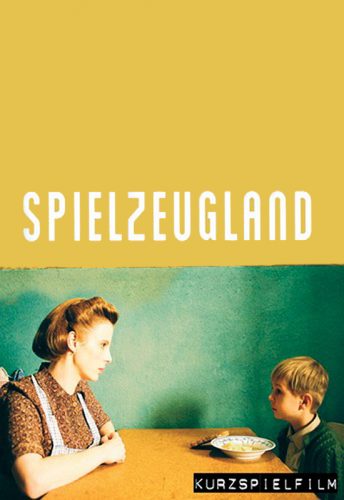
Each day of the Summer Teachers Institute, the teachers and participants submitted evaluations. We were delighted by the responses and feedback we received from teachers. Comments such as, “very in-depth discussion of the 4 phases of the Nazism and the Holocaust. Love the chronology activity with the anti-Jewish laws on notecards. Mary is very engaging and makes people think! I loved that she modeled exactly how we could teach in our classroom.” “Mr. Hane’s story is spellbinding! A truly amazing man!” “Some things I knew, but so much more I had no idea was going on in America, Great resource to know about!” “Fabulous. I’m so excited to bring this to my school. I’m sure our history teachers will use this exhibit too.” These remarks demonstrate the extent to which our Summer Teachers Institute provides a high-quality educational experience for teachers.
Because our Summer Teachers Institute meets the qualifications of both the Maryland State Department of Education as well as Baltimore City Public Schools for high quality professional development (to qualify, we need to submit an application for review), we can offer participants professional development credit. To be eligible for the credit, teachers must turn in a written reflection (for MSDE credit) as well as an implementation plan (i.e. lesson plan, for Baltimore City). These reflections and teaching plans provide another measure for assessing programmatic impact for teachers and which resources they plan on using. It was gratifying to learn from this year’s submissions that teachers plan on integrating content from each session as well and many of the websites, books and lesson plans they received. Evaluation and reflections also provide important feedback as we plan for next year’s program.
We are grateful to our program partners: Baltimore Jewish Council, Towson University, the Louise D. and Morton J. Macks Center for Jewish Education and MSDE for their help in planning this year’s program. We are also grateful to our program funders, Judy and Jerry Macks and Family and the Joan and Joseph Klein, Jr., Foundation for enabling us to reach out to such a such a diverse group of educators and provide them with valuable classroom resources.
